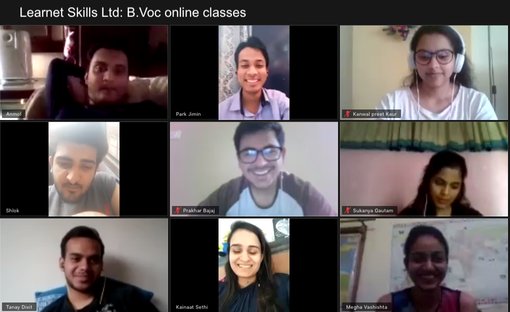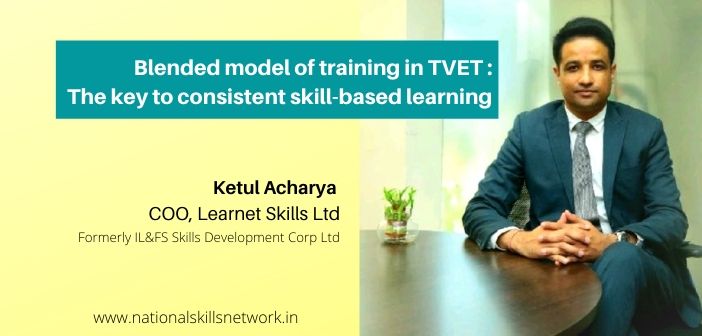Skilling youth in the time of the COVID-19 pandemic has become the most crucial challenge for the entire skilling ecosystem. Everyone is trying to cope with the crisis using many innovative ways. The unprecedented situation has given a boost to online learning through digital media. However, in the TVET space, online learning alone is not enough. It requires the blended approach to design skill-based learning. To learn more about the challenges and other practical aspects of skilling in the TVET, Team NSN spoke to Mr. Ketul Acharya, COO, Learnet Skills Ltd a joint venture of NSDC and Schoolnet India Ltd (formerly IL&FS Skills Development Corporation Ltd).
In this Skill Talk, Mr Ketul Acharya talks about the skill requirements, online learning adaptation and need for a blended approach which is fast becoming the need of the hour. Below are a few excerpts from the conversation in the backdrop of how Learnet is coping with the situation, using their online learning platform.
Re-imagining skilling in the time of COVID-19 crisis
Skilling is radically transforming with the outbreak of the global Coronavirus pandemic. Skill training centres have been closed and all training programs have come to a halt. The students are back in their home. They have no idea how to utilize their time and are also uncertain about the future.
Adapting the online learning medium in most innovative ways possible is the only way forward. It will bring back the students to the virtual class and engage them productively, besides keeping continuity with learning. Our online learning platform has been designed to cater to the blended learning needs of the TVET space. In the TVET space, both practical skilling and knowledge components are equally important. The percentage would vary depending on the nature of the job.
- The vision of the platform is to leverage technological advancement to provide skill based learning to our trainees even after this crisis gets over.
- The theoretical knowledge part has been incorporated in such a way that the trainees can access them as
 self-learning. For the practical and hands-on training which is an important aspect of TVET, we try to use the technology wherever possible. The platform contains videos where everything has been explained step by step.
self-learning. For the practical and hands-on training which is an important aspect of TVET, we try to use the technology wherever possible. The platform contains videos where everything has been explained step by step. - We provided training to our trainers on how to take online sessions. They were given access to some online platforms where they could learn more. They themselves make use of any source to learn more on these areas and always try to keep the trainees engaged through mediums like WhatsApp, email and WhatsApp groups.
- We also facilitate our trainees with practical training which they can avail as per their convenience in the nearest training center. However, in the current scenario it is not possible for the trainees to leverage the benefits of practical training.
- To cope with the crisis and still continue skilling our trainees, we have encouraged our trainers to demonstrate the practical part of the training as much as possible through videos. They were asked to make use of the copyright free online learning platforms to provide training to the trainees.
- Our trainers are available for the students through WhatsApp, Zoom calls, and other online mediums where they spend a couple of hours connecting with the trainees and engaging them in online learning.
 Putting the online learning processes in place
Putting the online learning processes in place
Most of our efforts are directed at putting the processes in place with concerted efforts towards capacity building, this includes:
- Capacity building of trainers to teach online using free tools and eSkillIndia portal
- Online teaching methodology that includes motivating and engaging students through individual interaction
- Details of conducting an online session and following it up with home assignments for self-study
Also read: Use of technology for skill-based training – K-Yan, K-Skills and other innovations from IL&FS – visit: https://nationalskillsnetwork.in/k-yan-k-skills-ilfs/
Learn English anytime, anywhere with English Bolo from IL&FS Education – visit: https://nationalskillsnetwork.in/english-bolo-ilfs-education/
Challenges of consistent skill-based learning through blended mode of training
The entire skilling ecosystem is new to the online way of skilling and learning. There are challenges which need to be addressed as we adopt e-learning during the present crisis:
- In online learning, the one major challenge is connectivity issues. As the entire nation is going online, connectivity has become an issue. The trainees who are from rural areas don’t have the best of the internet connectivity.
- The students from the challenging backgrounds will have a tough time leveraging the benefits of online learning as they don’t have access to good internet facilities, smartphones and other digital devices.
- Skilling in TVET space is mostly about hands-on experience. Hands-on experience and practical knowledge are difficult to deliver through online.
- E-Learning is a challenge in itself. People are not yet ready to accept the online mode of learning. People’s mindset about the whole learning scenario must change. It needs intrinsic and extrinsic motivation to complete the entire course. The engagement of both the trainers and the trainees is essential.
The way forward in the blended mode of training
As blended learning is the key, we need to focus on both the aspects of skilling. The knowledge part could be easily gained through online platforms. For the practical training, all the DDU-GKY, PMKK and other state centers should be used as the nearest training centers. These training centers should be available to trainees. There could be a small fee to access and use the infrastructure of the training centers. This will help the trainees as well the training partners. This could be a possible way forward to implement the blended learning model integrated with remote assessments and certification.
Coping with this unprecedented time is difficult, yet inevitable. As TVET space should have the perfect balance of knowledge and skill, blended learning is the way to go forward. Solving the basic issues related to connectivity, providing training to the trainers and engaging the trainees in the most innovative way should be the focus of the entire skilling ecosystem.













Ami baire theke esechi …. amar name – Himan Roy….vill – baidyapur..p.o – manikora, p.s – habibpur, dist – malda,